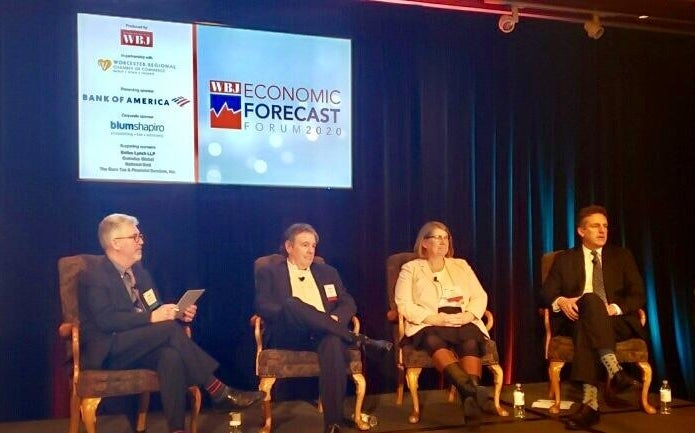A Wednesday morning panel of Central Massachusetts business experts and a senior economist from the Federal Reserve Bank in Boston predicted the moderate growth the local and national economies have experienced since the end of the Great Recession will continue into 2020.
“We see no reason why this won’t continue just because it is long,” said Ann Tripp, executive vice president and chief investment officer for the Hanover Insurance Group in Worcester and its subsidiary Opus Investment Management.
Tripp and the rest of the experts laid out their positive outlook for the 2020 economy in the region, state, nation and world during the Economic Forecast Forum presented by the Worcester Business Journal and the Worcester Regional Chamber of Commerce at the Beechwood Hotel on Wednesday.
“So, I guess we are good for the coming year,” WBJ Publisher Peter Stanton said.

Daniel Cooper, senior economist and policy advisor at the Federal Reserve Bank of Boston, said while some concerns are on the horizon — like the coronavirus causing a scare in the global economy — growth should continue both nationally and in Central Massachusetts.
“Moderate growth should continue this year, and while risks to the outlook remain, some from last year have diminished,” Cooper said.
Tripp said new developments like the U.S. initial trade deal with China, a finalized Brexit deal and better indicators from the U.S. manufacturing industry have created an optimism for positive economic output this year.
She cautioned the economic growth would be moderate — around 2% — on par with the annual average since the Great Recession ended in 2009.
Risks do remain globally and in Massachusetts, said Jay Ash, the president & CEO of the Massachusetts Competitive Partnership.
In Central Massachusetts, the lack of available talent for job openings, rising housing and living costs, rising income inequality, uneven statewide growth, and the steady decline of the manufacturing workforce could lead to trouble with economic growth, Ash said. In addition, trade wars and low global economic growth could impact the local economy.
Still, Massachusetts has had unemployment under 4.0% for 48 straight months, and the state has thriving sectors like life sciences, financial services, education and technology, Ash said.
“The diversity of our economy is very strong, so we can take a hit to any one sector,” said Ash, who is the former Massachusetts secretary of Housing and Economic Development.
Arthur Maxwell, founder and chairman of Leominster furniture manufacturer AIS, which moved into a new 500,000-square-foot facility in 2017, said his company is predicting to grow its revenue 12.5% this year, compared to roughly 1% for the national manufacturing industry.
“Massachusetts has been very good to us,” Maxwell said.
Ash, who helped the City of Worcester convince the Pawtucket Red Sox to move to a new $132-million, city-owned baseball stadium in the Canal District starting in 2021, said he believes the ballpark and the team will be good for the city.
Normally, Ash said he doesn’t support stadiums as economic development tools, but he believes the brand name of the Red Sox will make the Worcester stadium an exception.
When asked whether the stadium and its $125 million in surrounding private development would lead to gentrification in the Canal District and make lower income populations increasingly vulnerable, Ash said it is better to encourage more wealthy people to come to Worcester and then deal with the backend fallout with initiatives like affordable housing, public transit and direct assistance.
“The best thing Worcester can do is to find more ways to bring people with wealth to the community,” Ash said.

